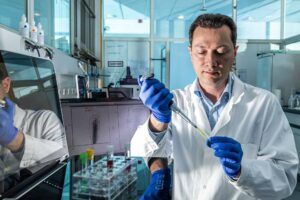In July 2024, the journal Frontiers in Microbiology presented a groundbreaking method that overcomes this hurdle: the Flow-FISH method.
Probiotic intervention in the gut–prostate axis with novaPROX combo: insights from an in vitro study
The study published on Foods Journal researched the mechanisms of action of Probionova's novaPROX product using a 3D intestinal barrier model and a co-culture prostatic model.
Industry
On the second anniversary of its launch, Ferring Pharmaceuticals’ REBYOTA remains a landmark innovation in the prevention of recurrent Clostridioides difficile.
Gastroenterology, Immunology
The findings of a recent study suggest that while T. musculis can worsen asthma, it might also help the body fight off infections, offering potential for new treatments targeting the…
Dermatology
The skin can independently generate immune responses to control the microbiota and prevent infections, without relying on other immune centers.
Industry
Lonza's capsules ensures targeted intestinal delivery enhancing stability and therapeutic efficacy for LBPs and pharmaceutical applications.
Industry
Cmbio announces a strategic partnership with Nimble Science to deliver first in class high-quality, multi-omic data insights from the small intestine.
Gastroenterology, Cardiology
Nicola Segata, from University of Trento, investigates the intricate links between diet, microbiome composition, and cardiometabolic outcomes.
Pediatrics, Otolaryngology
The findings suggest that the microbial communities inhabiting an infant’s nose and throat can play a role in the severity of RSV infections.
Scientific research
The findings suggest that bHB could be a therapeutic alternative to a ketogenic diet. The results also highlight the protective role of the gut microbiota and its metabolites in autoimmune…












